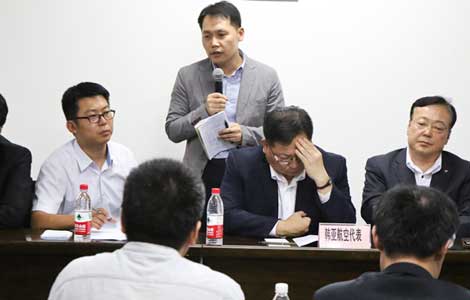Taking the heat off the solar dispute
Updated: 2013-07-19 07:08
By Patrick Schroeder (China Daily)
|
||||||||
The global solar photovoltaic (PV) products' sector faces a new challenge in the form of trade disputes between major producers and consumers. These disputes are quite testing, because there is a fine balance between creating a level playing field in the market and the need to make solar technology more affordable for the majority of the global population.
Following the recent imposition of 11.8 percent interim anti-dumping duty by the European Union on solar PV products imported from China, including panels, cells and wafers, the issue has become highly politicized between the two sides, among the EU member states and the key players of the solar PV industry.
Subsequently, the EU and China have held negotiations on "price undertakings", with the EU saying Chinese solar panels would be sold at a certain minimum price in the European market. These trade talks were initiated at the annual EU-China ministerial-level meeting of the joint economic and trade commission in Beijing on June 21. China's Minister of Commerce Gao Hucheng and EU Trade Commissioner Karel De Gucht co-chaired the talks, where trade issues, including the solar panel dispute, were discussed.
The negotiations are continuing and, under the current proposal, the total power-generating capacity of Chinese PV modules imported by EU should be below 10 gigawatt a year, with a minimum price of 0.5 euro per watt. This will make the prices of Chinese solar products sold in the EU more comparable to those of European panels.
Both sides, however, are under pressure to reach an agreement before Aug 6, failing which the EU will raise the anti-dumping duty to 47.6 percent, which could be followed by an EU decision in December to continue with the anti-dumping duty for the next five years.
There are several reasons why the EU and China should reach an agreement on the issue which allows both sides to save face and will facilitate the healthy development of the global solar products' industry.
First, such an agreement is necessary to prevent the EU-China trade conflict from spilling beyond the solar PV panel sector. Beijing has already initiated an investigation into EU wine exports to China. To prevent the row from escalating into a full-scale trade war and harming long-term EU-China cooperation in fields such as clean energy and climate change, the two sides have no option but to find a workable solution.
Second, an agreement on solar panels will help the EU and China, as key players in climate change negotiations, maintain a good working relation and reach a fair, ambitious and legally binding climate agreement under the United Nations Framework Convention on Climate Change in 2015. If the solar panel issue is not resolved amicably, it will cast a shadow over EU-China relations and could further delay a binding climate agreement at the already protracted climate talks.
Third, an EU-China agreement on solar products can serve as a good example for other countries to resolve their renewable energy trade disputes with China. The resistance to Chinese solar products is not limited to the EU, although its impact is the worst because the bloc accounts for about half of China's solar product exports. The exports of Chinese solar products to the US are already suffering from anti-dumping tariffs.
China also faces a number of potential disputes over solar PV products with other countries, including low-cost manufacturing hubs like South Korea, India and Malaysia. In South Korea, many companies have stopped new investments, because they cannot compete with their Chinese counterparts. And as recently as July 5, India announced that it was launching an anti-dumping investigation into Chinese solar products that have not only displaced Indian products from the EU market, but also captured a large share of the country's domestic market.
And fourth, such an agreement would address the issue of market consolidation and control the overproduction of solar PV products in China. The sector will see some reshuffling necessitated by the overproduction capacity of the solar PV sector, which would have happened even if the EU had not imposed the anti-dumping duty.
This does not mean that the Chinese government should stop supporting the solar products' industry. But instead of supporting the industry to produce mainly for the export market, the government should also promote the development of its internal market, especially by offering incentives for decentralized solar PV panel installations. The government has to adjust its policy to include a feed-in tariff for distributed rooftop solar PV panels for the housing market.
An amicable agreement between the EU and China is definitely possible. To make it a reality, it is necessary for both sides to look beyond the trade issue, to the common challenge of climate change and cooperation opportunities in the transition to green economy.
To tackle climate change on the global level, it is necessary that the EU and China hold negotiations in the spirit of cooperation and openness, and encourage and support each other to increase their domestic capacities to produce and use solar products, and keep the clean energy market functioning.
The author is senior international advisor to the China Association for NGO Cooperation.
(China Daily 07/19/2013 page9)

 Detroit files biggest ever US municipal bankruptcy
Detroit files biggest ever US municipal bankruptcy
 Plane crash victims' parents seek answers
Plane crash victims' parents seek answers
 'Improving' Mandela marks 95th birthday
'Improving' Mandela marks 95th birthday
 Qingdao eatery finds use for pesky seaweed
Qingdao eatery finds use for pesky seaweed
 From university campus to boot camp
From university campus to boot camp
 FIFA head: World Cup in Brazil could be mistake
FIFA head: World Cup in Brazil could be mistake
 Bomber as rock star? Rolling Stone cover outrage
Bomber as rock star? Rolling Stone cover outrage
 German band performs with 3D stage set
German band performs with 3D stage set
Most Viewed
Editor's Picks

|

|

|

|

|

|
Today's Top News
Obama weighs canceling Moscow talks with Putin
Pentagon to field 4,000-person cyber squad
NSA implements new security measures
Detroit files biggest ever US municipal bankruptcy
China's Sansha city dock begins operating
Yuan: Collateral types to expand
Autopsy ordered for Hunan fruit seller
Plane crash victims' parents seek answers
US Weekly

|

|







